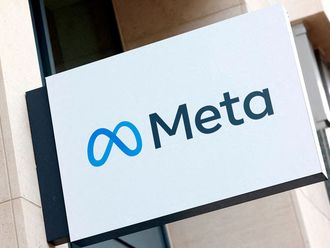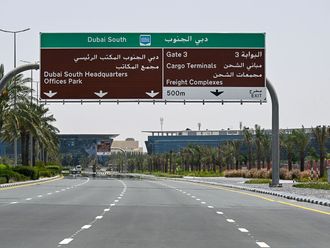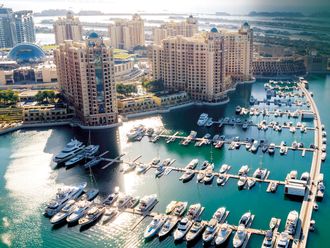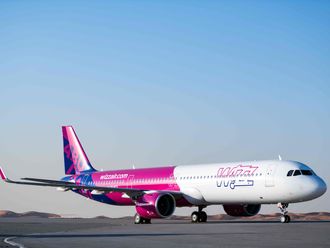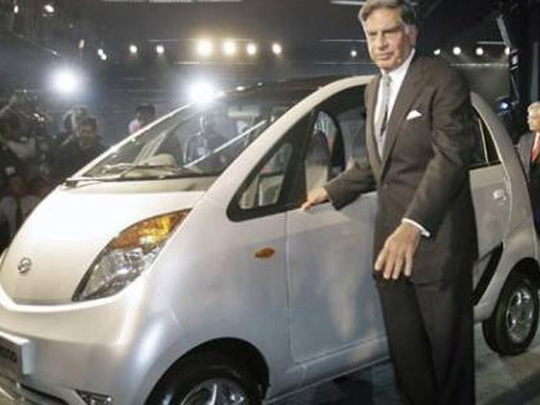
Mumbai: Tata Motors Ltd, maker of the world’s cheapest car, is turning to China to buy autoparts unavailable in India as it seeks to offer vehicles with automatic transmission at home, Chairman Ratan Tata said.
The maker of trucks, sedans and utility vehicles may benefit from “unbelievable” prices at Chinese component makers, he said in an interview with Charlie Rose that aired on July 6. Tata, who will step down as head of the company in December, spoke on topics ranging from cars to philanthropy. The company will buy “sub-assemblies” including automatic transmissions from neighbouring China, he said.
Chairman Tata, 74, who led the truckmaker’s move to manufacture cars in 1999 and purchased Jaguar Land Rover in 2008, is seeking to offer a wider choice to entice customers as competition from Toyota Motor Corp and Ford Motor Co intensifies at home. Profit at the company’s Indian unit, which makes the $2,700 Nano (Dh9,914), fell to its lowest in three years in the 12 months ended March 31.
“Sourcing from China would be the only way forward for Tata given that an Indian supplier may not be willing to build something like an automatic transmission unless the volumes were high enough,” said Deepesh Rathore, the New Delhi-based managing director of IHS Automotive in India.
Tata Motors’ domestic business doesn’t produce any automatic transmission vehicle, according to its website, while Maruti Suzuki India Ltd, India’s biggest carmaker by volume, offers five automatic variants of the 15 it sells. Hyundai Motor Co, the country’s second-largest carmaker, offers the technology on most of its eight models.
Tata’s plans
Tata Motors has risen 36 per cent this year, buoyed by record sales at its Jaguar and Land Rover units, making it the third-best performer in the 26-member MSCI Emerging Markets Automobiles & Components Index. It rose 0.9 per cent to Rs242.7 (Dh15.91) at 11.32am in Mumbai.
Ratan Tata’s move to purchase Jaguar for $2.5 billion helped Tata Motors, the biggest company in India’s largest business group, expand overseas and tap sales in China.
“China is the largest automaker and auto market in the world and it’s going to get even more predominant than it is today,” Tata, who will be succeeded by Cyrus Mistry, said in the interview. China has “produced cars which in fact exceed what India did in the same period of time”, he said.
Sales of Jaguar and Land Rover in emerging markets including China helped the company more than double group profit to a record Rs62.3 billion ($1.1 billion) in the year to March.
‘Visible goal’
Tata, who also spent $12.9 billion in 2007 to acquire Corus Group Plc and helped propel Tata Steel Ltd. into India’s biggest maker of the alloy, plans to focus on rural development, water conservation and child nutrition after he steps down as chairman of Tata Sons Ltd., the group holding company, and its units.
“My most visible goal is to do something in nutrition to children in India, and pregnant mothers,” Tata said. “Because that would change the mental and physical health of our population in years to come.”
In the 2005 National Family Health Survey, when India last weighed, measured and counted its children for signs of hunger, it found 46 per cent — 31 million — weighed too little for their ages. In 1999, that number was 47 per cent.
At Tata Motors, his successor Mistry, will need to decide whether the company wants to continue making passenger cars at home or exit the business, said Rathore. Market share at the company that sells vehicles including the Indica, Sumo and Indigo fell to 13 per cent in 2011 from 16 per cent in 2007.
India’s poor
Profit at the local unit, which started as Tata Engineering & Locomotive Co in 1945, fell 31 per cent to Rs12.4 billion in the year ended March 31. Sourcing products from China may help Tata Motors control costs at home, said Ammar Master, an analyst with LMC Automotive based in Bangkok.
“Chinese component makers have advanced themselves in quality, and the vendors have geared up to supply components to global manufacturers, who now have a presence in China,” Master said.
Apart from boosting growth, Mistry may also seek to make products for India’s 900 million people who the World Bank says live on less than $2 a day.
“Thinking of how to make products that are affordable to that segment of the population, I think, is a real challenge,” Tata said. “We haven’t succeeded in being innovative enough to do that.”



